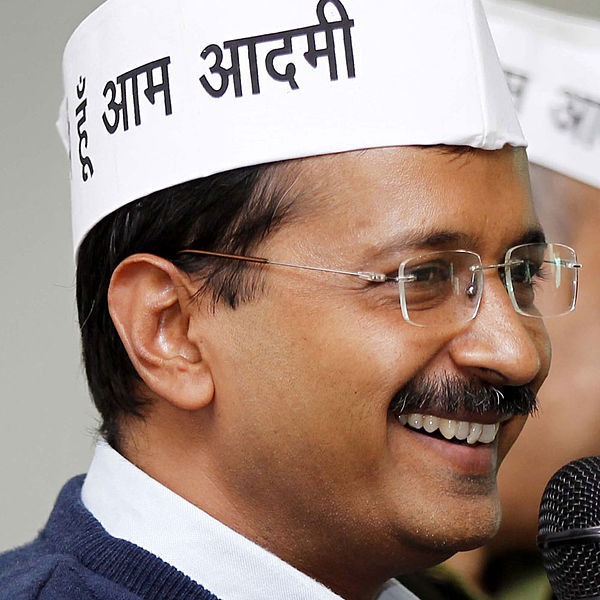Delhi saw a strong anti-Congress sentiment coupled with an anti-establishment sentiment this time. Thus while people were disillusioned with the ruling Congress, they were not automatically drawn to the bigger established rival BJP, as they saw an alternative in the form of honest, sincere people standing for elections, with a view to cleaning up the entire system. But the idea of alternative, clean politics with good leaders has been there since a long time and we have seen several attempts in the past by newly-formed parties and independent candidates in different states. But they were not able to make the kind of impact that the Aam Aadmi Party (AAP) has.

Arvind Kejriwal. Pic courtesy: Wikimedia
- 3.56 lakh voters in Chhattisgarh (3.07% votes)
- 5.9 lakhs in Madhya Pradesh (1.9% votes)
- 5.67 lakhs in Rajasthan (1.92% votes)
The reason that ordinary people were so angry and outraged was also because food inflation has been sharply eroding the real income of large sections of Indian society, in particular the poor. On top of that, or even underlying that, was corruption. It is fashionable to argue that corruption does not matter, or people are used to it, or that corruption has been around since the times of Chanakya but that's not how it is. What happened to Rajiv Gandhi in 1989 or to Indira Gandhi in 1977?
One reason that some of us expect it to be so is because it addresses so many ills, at the heart of which lies corruption. Corruption is not just the greed or venality of an individual or a party - it is linked with how political parties are funded, it is linked to the way natural resources belonging to the country are exploited by the very government which claims to be its custodian, it is linked to the question of governance, or rather the lack of it. All these combine to create an environment of anti-corruption sentiment.
AAP has made young people aware that if you want your elected representatives/political administration to be more responsive to the aspirations of the ordinary people, then you have to look at new political paradigms or political structures. You have to look at a system where an ordinary person can get elected even if he does not have a lot of money and muscle power, and cannot distribute free liquor and freebies.
The belief that one clean party, or individual, can make a difference to a politics and economics and society where corruption is so deeply ingrained is what AAP has been able to inspire. The movement has cut through all cynicism and tapped into that hope and idealism, especially among the youth.

•
The Anna Hazare phenomenon
•
Bangalore MLA races may spark change
Even within the capital, people will ask, "You are great as street-fighters and agitators, but can you govern?" It's one thing to promise to halve the electricity expenditure and ensure a minimum water supply to every household or fill up all vacant posts for teachers, it's another to prove that you can be a party of good governance and actually clean up the systems. Across the developing world, there are innumerable examples of people who've led political movements or movements for social change and have become as corrupt, as authoritarian, as venal or as dictatorial as the people they displace. That is a clear, present and real danger. The challenge for AAP will be to deliver what has been promised, ideologically and concretely.
It looks likely that Delhi will see President's rule for sometime and then another round of elections will be scheduled, possibly to coincide with the 2014 general elections. Re-elections augur well for the AAP in my opinion, because many people who may have been hovering on that border of uncertainty and fearing that a vote to AAP will merely be a waste will now be forced to think otherwise, given the proven wave of support for the party.























